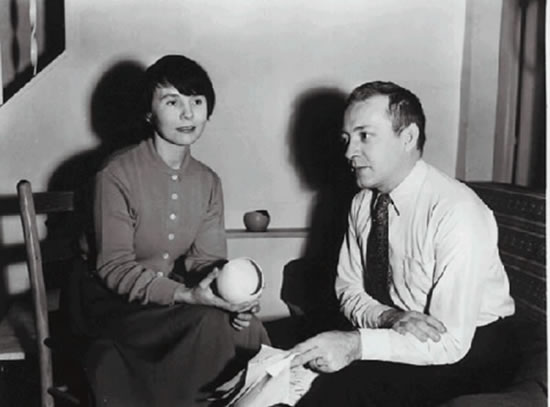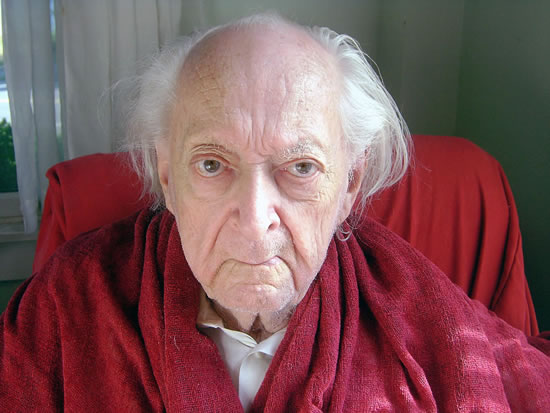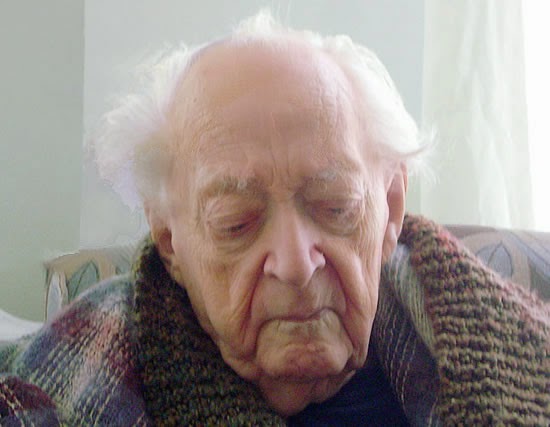Weston Neil Andersen was an American ceramic designer, craftsman and entrepreneur who in 1952, established Andersen Design Stoneware with his wife Brenda in the coast of Maine, USA, . He was also my father whom I loved and cared for and was cared for by during the latter years of his life. This is the story about the last five years in which he suffered from a brain injury. Weston was known throughout his life for his analytical mind, which was not affected by the brain injury but it compromised his ability to express his thoughts in complete sentences. During the last five years of his life, Weston spent many hours in deep reflection, seldom seeming to be bored. At times he would sleep for a very long time and when he awoke , he would say that he gotten a lot of work done. In mild weather, he spent many hours of the day sitting on the front porch taking in the natural surroundings and the community walking up and down the street which usually left him in a very good mood.
During his younger days, both Weston and his wife Brenda professed to be agnostics but both in their own unique ways came to accept the existence of God.
Brenda died in 1994. Before her death, Brenda was in a coma for many hours with the family gathered around her. I was at a turn of holding her hand when suddenly I felt a spiraling motion swoop down. encompass and transport me into an open sky colored pink and filled with gold rimmed clouds. I felt an indescribably deep love and then just as suddenly l was back in the room and Brenda was conscious and calling for Weston. Brenda told Weston that she loved him, not words that came easily to her during her life and then she died.
Some will surely find the telling of this experience unbelievable but I can only testify to what happened as I experienced it, which seemed an experience in which there was no separation between my mother and myself as she/we were embraced by God’s love. My Mother’s encounter with death as revealed to me through the experience was as emotional as the way that she lived her life. As Dad used to say, she was always emoting. The visual imagery that I experienced was consistent with the Catholic background in which my mother was raised as a young English girl in London before and during World War II.
 |
| Weston & Brenda in the 1950’s – photograph by unknown |
During the years after Brenda’s death and before Weston suffered macular degeneration which interfered with his ability to read, we shared many common reading interests uncommonly found in our larger community. Dad and I both read extensively in esoteric wisdom and quantum theory- which is to say the philosophy emergent from quantum physics, which does not prove the existence of God but which is consistent with the teaching of esoteric wisdom. Dad read Carlos Castaneda and I read Christian Hermeticism and we both read David Bohm’s Wholeness and the Implicate Order and The Non-Local Universe by Menas Kafatos and Robert Nadeau among many other books. When he could no longer read, Weston listened to the entirety of the New Testament on tape.
 |
| These three early wine decanters display Dad’s approach to ceramic design and glazes |
Through out his life Dad was accustomed to seeing ghosts in our very old house in Maine. This did not frighten him, nor did he consider it to be anything unusual. The ghosts were as much a part of the natural world as any other phenomenon He often spoke of the Sea Captain in the living room. Once he told me that the woman in the other room was very up set and that I needed to go that I needed to go and talk to her. I did so, although I could not see the woman.
Weston was a man of great intellectual and analytical capacity but with the brain injury limiting his ability to express his thoughts, his heart took on a stronger presence. He spent hours contemplating his life and often spoke of his wife, his mother, father, siblings and others he had known in his life. At his age he was aware that his days on this earth were numbered and it appeared to be that he was preparing himself for his own judgment day as he spent hours upon hours in contemplation of his life, past present and the future when he was gone.
During the period after his brain injury, Weston relived his life chronologically and so we came to know him at many different stages of life As a boy.Weston lived on a chicken farm. One day, as an elderly man he suffered a seizure. When we entered the hospital we heard someone screaming “Chicken” . It was Dad, who appeared to be reliving an early memory when he first realized that the chickens were destined to be killed. and was very upset by it.
When World War II broke out.Weston considered declaring conscientious objection but realized that if someone were trying to kill his family, he would kill them and so he enlisted. One day during his latter years he was in tears over a recollection of a man who had returned from the war missing his legs.
The morning that I took this picture of Weston, the expression on his face was clear and innocent. I probably told him that he looked so handsome. Many of the caretakers who saw Dad over the years would say the same. At many times he had a engaging and gentlemanly nature that charmed the people around him.
On other days he looked like this:
 |
| I am thinking thoughts too intense for words ! |
 |
The bright afternoon light streams in the window interacting with the shadows and light of the makeshift photography studio on the kitchen table. Suddenly Dad became very animated and was in a verbal rhapsody describing the rhythms and forms in the display and counting them.
After Dad’s brain injury counting and the spelling of words took on particular significance, used for emphasis or explanation. If in pain, the word “ow” was spelled. Once when we called the paramedics because Dad had fallen out of bed, Dad explained everything to them by spelling the words as if spelling the words clarified the meaning, a curious phenomenon indeed. Spelling has to do with the ability to express thoughts to others involving the part of Dad’s brain, which never fully recovered. leading one to wonder if the actual process of thinking is primordial to the process of communicating in language. Did spelling take on such meaning because of its function as a tool of communication?
In the years after Brenda died, Dad worked on this sculpture. After his brain injury he spent time observing it. One day while sitting on the front porch as he often like to do, he turned to me and asked that I would make a sculpture of him.
Dad would become involved when I worked on a sculpture, turning it as I worked and always letting me know what he thought. Here he is touching some wax sculptures in the works.
The day Dad fell and injured his brain, he was working on a project to have the mugs produced for the commercial market. I have now taken over the project. This is one of my favorites. Dad hand scraffitoed the spiral on the mug himself. I have to figure out how to translate this decorative technique into a commercial process. I understand his thinking on this project, not just in terms of the mug but in terms of the evolution of our family ceramic business.
Two hand cast stoneware steines, one decorated by Brenda and the other decorated by Weston
One day Dad was looking sad and said that he had nothing to do. A few weeks later he said, “There are three people here and so there a three musicians.” (This was said as a full sentence which was extremely rare.) I gathered up all the instruments I could find and we all played. Dad took to the keyboards. As a young man Dad’s mother had wanted him to learn to play the piano but he refused. He did not play in a learned way but he played with deliberation, He preferred to play when no one was around but we could hear him in the other room.
Throughout his life Weston enjoyed classical jazz. As a young adult he went to Chicago and New York and listened to the greats playing in small venues.
|
One day we put on Sade and he listened to her for several hours. He said it is very involved. We introduced him to Bruce Springsteen and Bob Dylan and Mazzy Star, He stayed up late into the night listening to trance like music of Mazzy Star over and over again.
A few days before Dad died I was picking out the notes to Sweet Georgia Brown. I asked Dad if it sounded right and he looked at me and smiled his sweet smile, |
Dad survived that injury to live five more years, dying at the age of 93. Three days prior to his death he was sleeping deeply and as peacefully as I had ever seen him sleep. Around five in the morning of the day that he died, my sister checked on him and found him sleeping with a karge smile on his face. Dad often worried during his life time and I would tell him, you just have to have faith. I think he found that faith. He chose when to go. Of course I wanted him to stay longer but I have accepted the wisdom of his decision. People say the are sorry for our loss, which I appreciate, but I really do not feel a loss because I do not feel my father is gone, he just went on to another stage of his journey, like the ghosts he used to see in our house and consistent with the nature of time in quantum theory and esoteric wisdom, Dad is still very much with us.

















